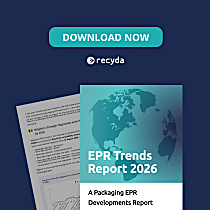Gaia Biomaterials expands into Chile with compostable limestone-based plastic alternative
Gaia Biomaterials has entered its first Latin America agent agreement with Smartpack, making its compostable plastic-alternative material, Biodolomer, available in Chile.
Biodolomer is a Swedish plastic-alternative material based on limestone that can be used for most applications where plastic is normally used. It is fully compostable and leaves no microplastics when it decomposes.
“The market here needs new sustainable alternatives to fossil plastic, and we need it now”, says Christian Spoerer, commercial director at Smartpack.
“Biodolomer has proven to be a perfect match for us.”
Demand for single-use alternatives driven up
Chile recently passed a law that will ban all single-use plastic in several fields, driving up demand for non-plastic materials that still have all the characteristics of plastic.

“Smartpack specializes in providing complete packaging solutions,” adds Spoerer. “We handle everything from production line design to machine installation and material supply. When we tested a ton of Biodolomer, it seamlessly integrated into our existing processes.”
The company has just placed its first full container order of Biodolomer. The first products that will be made from Biodolomer in Chile are e-commerce shipping bags.
“It is interesting to see the demand for our material in new markets around the world,” says Gaia Biomaterials CEO Peter Stenström.
“Chile is so aggressive in the sustainable transition, and we are already in discussions with companies from other Latin American countries.”
In other advances in plastic alternatives, Yangi recently unveiled its latest packaging innovation, a fiber-based food tray designed to replace conventional plastic trays in the food sector. Crafted from fully renewable FSC fibers, the versatile tray applies to ready meals, meat trays and takeaway options.
US researchers at Woods Hole Oceanographic Institution, Massachusetts, discovered that a new version of cellulose diacetate — a plastic-like polymer derived from wood pulp — is the fastest-degrading bioplastic in seawater. The study authors have partnered with scientists from packaging technology company Eastman, which is providing funding and resources for the research.
Meanwhile, Fortum Recycling & Waste successfully produced biodegradable plastic using CO2 emissions from waste incineration at its plant in Riihimäki, Finland. The Finnish circular waste management company expects to expand this new material production primarily for sustainable food and cosmetics packaging and potentially other sectors like toys and home electronics.












